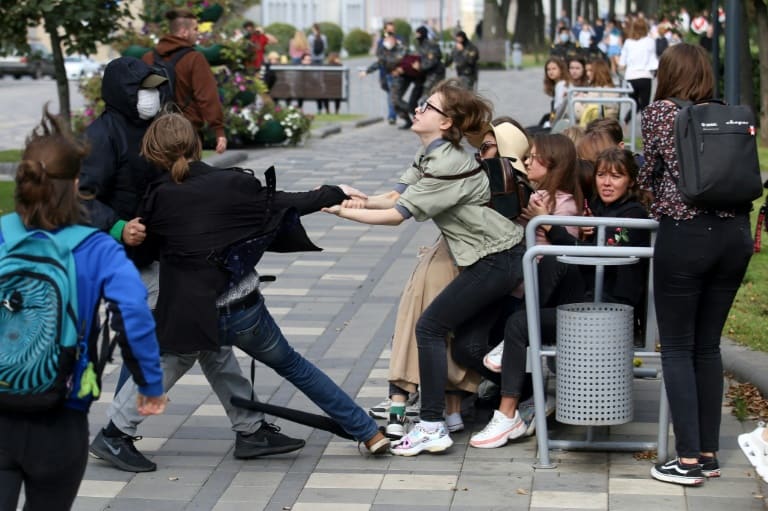Article, FEATURED STORIES, WORLD
Belarusian Diplomatic Crisis escalate as Activists Stabs Himself in Court

Belarusian police arresting and detaining students in Minsk. Photo credit/Bangkok Post
Belarusian authorities diverted a Ryanair plane flying from Greece to Lithuania to arrest the exiled dissident journalist Roman Protasevich on May 23rd. The brash move by the Belarusian government sent shockwaves through the European diplomatic world, and it received strong condemnation from the European Union and the United States.
Belarus has been a hotspot for protest action against the government since May of last year when Belarusians took to the street to demand the resignation of President Alexander Lukashenko, who has served in the role since 1994.
Lukashenko has long played both sides of European Union-Russia tensions, oscillating in support between the two based on where he could see the biggest benefit.
Now that tensions are boiling with the EU, the long-time president is turning to Russia for increased support.
US Condemnation and Hypocrisy
US Secretary of State Antony Blinken issued a statement strongly condemning the flight diversion and arrest of Protasevich.
Many quickly pointed that the United States, in collaboration with several European governments, grounded then Bolivian President Evo Morales in Vienna on suspicion that the head of state was transporting whistleblower, Edward Snowden. President Biden was then serving as President Barack Obama’s Vice President.
France later apologized for the incident, and UN Secretary Ban Ki-Moon condemned the grounding of the Bolivian President’s plane, stating that the plane of a Head of State enjoys immunity.
Unsurprisingly the United States and its European allies did not face the consequences for the illegal grounding of the plane.
Who is Roman Protasevich?
Protasevich rose to prominence last May when the protest movement to remove President Alexander Lukashenko from office began. The journalist and activist ran the Nexta Telegram channel, an important source of information for protestors on the ground.
Protasevich moved to Poland in 2019 before the most recent protests had broken out. Protasevich’s connections to the nationalist, neo-Nazi Azov Battalion have been called into question. Still, Western media has mostly covered the plane hijacking angle instead of digging into Protasevich’s past.
Several researchers have uncovered pictures of a man who looks like Protasevich in military garb with the Azov Battalion. Protasevich has claimed that he was in Ukraine at the time only as a journalist, but increasing evidence points to a more involved role in the conflict.
The Belarusian government has leaned in hard to the evidence pointing in this direction and attempted to paint Protasevich a right-wing political extremist. And while they want to make it look as if his sketchy political views are the reasons he was arrested, it seems pretty clear that he was arrested for his role as an opposition activist.
Protasevich’s politics point to an uncomfortable reality for many in the West who support regime change in Belarus; the opposition is a mishmash of political beliefs with some less-than-savory elements.
And despite months of widespread demonstrations and brutal government crackdown, Lukashenko remains in power. Lukashenko’s latest stunt makes it seem he is more confident in his ability to intimidate dissidents brazenly. Some governments have ratcheted up sanctions to put more pressure on the Belarusian government.
Will Sanctions Turn the Tide for Belarusian?
In response to the arrest of Protasevich, the European Union immediately banned Belarusian planes from entering its airspace. The European Union is also looking to impose sanctions on key sectors of the Belarusian economy to exert maximum pressure on Lukashenko.
Several opposition leaders have long been calling for increased sanctions. Still, it is so far unclear how much damage the US and EU can exert on Lukashenko without severely hurting Belarusian citizens and opposition forces still in the country.
The United States has repeatedly shown that its tolerance for loss of human life due to American sanctions is chillingly high. Infamously, when asked about the 500,000 Iraqi children who have died as a result of US sanctions, former Secretary of State Madeline Albright said in 2001, “I think this is a very hard choice, but the price–we think the price is worth it.”
Thus far, the Biden Administration has revealed that it is reimposing “targeted sanctions” to hurt the Lukashenko government.
The EU has also pledged 3 billion euros of grants and loans if the country “becomes democratic” (deposes Lukashenko). In 2019, Belarus had a GDP of $63 billion.
Meanwhile, the opposition within Belarus is becoming increasingly desperate under Lukashenko’s crackdown. One activist stabbed himself in the throat with the pen while appearing in court.
While many prominent opposition leaders and activists have fled the country for fear of repression and violence, there are still plenty of Belarussians being arrested for participating in the opposition.
Sanctions may exert pressure, but as Lukashenko and the EU have effectively burned all bridges, he will have no choice but to seek support from Russia.

